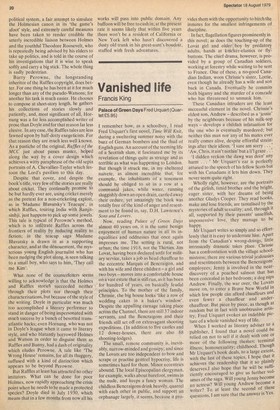Vanished life
Francis King
Palace of Green Days Fred Urquart (Quartet £5.95) I remember how, as a schoolboy, 1 read Fred Urquart's first novel, Time Will Knit, during a sweltering summer noisy with the buzz of German bombers and the thud of English guns. An account of the teeming life of a Scottish slum, it fascinated me by its revelation of things quite as strange and as terrible as what was happening to London. But though it struck me, in my sheltered naivete, as almost incredible that, for example, the inhabitants of a tenement should be obliged to sit in a row at a communal jakes, while water, running sluggishly down an open drain, carried away their ordure, yet amazingly the book was totally free of the kind of anger and resentment to be found in, say, D.H. Lawrence's Sons and Lovers.
Now, reading Palace of Green Days almost 40 years on, it is the same benign enjoyment of human nature in all its inequalities and oddnesses that once again impresses me. The setting is rural, not urban; the time 1918, not the Thirties. Jim Lovat, having been declared unfit for military service, takes a job as head chauffeur to the eccentric Marquis of Bencraigon, and with his wife and three children — a girl and two boys — moves into a comfortable house on a vast estate that is still run, as it has been for hundred of years, on basically feudal principles. To the mother of the family, Chrissie, the big house looks 'like a row of wedding cakes in a baker's window'. Despite the appalling carnage taking place across the Channel, there are still 37 indoor servants, and the Bencraigons and their friends still set off on extravagant shooting expeditions. (In addition to five castles and 12 dower-houses, there are also 88 shooting-lodges).
The small, remote community is, inevitably, narrow-minded and gossipy; and since the Lovats are too independent to bow and scrape or practise genteel hypocrisy, life is sometimes hard for them. Minor eccentrics abound. The local Episcopalian clergyman, for example, walks about barefoot, swims in the nude, and keeps a fancy woman. The childless Be ncraigons drink heavily, quarrel with each other in public, and support an orphanage largely, it seems, because it pro vides them with the opportunity to birch the inmates for the smallest infringements of discipline.
In fact, flagellation figures prominently in this novel; as does the touching-up of the Lovat girl and older, boy by predatory adults, hands at knicker-elastics or flybuttons. The chief drama, however, is provided by a group of Canadian soldiers, working at forestry while waiting to be sent to France. One of these, a no-good Canadian Indian, woos Chrissie's sister, Lottie, even though he already has a wife and son back in Canada. Eventually he commits both bigamy and the murder of a comrade who has threatened to unmask him.
These Canadian intruders are the least successful element in the novel. Chrissie's eldest son, Andrew — described as a `jessie' by the neighbours because of his milk-sop ways — develops a childish infatuation for the one who is eventually murdered; but neither this man nor any of his mates ever really comes alive, despite effortful strainings after their idiom. 'I sure am sorry. `Aw, Chris, it ain't nothin' but a li'l graze. . • 'I didden reckon the dawg was doin' any harm . . . ' Mr Urquart's ear is perfectly attuned to the speech of his fellow Scots but with his Canadians it lets him down. They never seem quite right. Wholly right, however, are the portraits of the girlish, timid brother and the bright, eager sister, with her dreams of being another Gladys Cooper. They read books, make and lose friends, are tantalised by the mysteries of adult sexuality; and, through it all, supported by their parents' unselfish, unpossessive love, they manage to be happy. Mr Urquart writes so simply and so effortlessly that it is easy to underrate him. Apart from the Canadian's wrong-doings, little intrinsically dramatic takes place. Chrissie has a confrontation with the village schoolmistress; there are various trivial jealousies and resentments between the Bencraigons' employees; Jenny is involved in the neardiscovery of a poached salmon that has been concealed in her bedroom; a dog nips Andrew. Finally, the war over, the Lovats move on, to enter a Brave New World in which few people can afford chauffeurs and even fewer a chauffeur and under chauffeur. But piece by piece, as though at random but in fact with unobtrusive artistry, Fred Urquart evokes an indelible picture of a whole vanished way of life. When I worked as literary adviser to a publisher, I found that a novel could be relied on not to sell if it dealt with one or more of the following themes: terminal illness; homosexuality; childhood. Though Mr Urquart's book deals, to a large extent, with the last of these topics, I hope that it achieves the readership that it so plainly deserves.I also hope that he will be sufficiently encouraged to give us further volumes of the saga. Will young Jenny become an actress? Will young Andrew become a writer? To at least the second of these questions, I am sure that the answer is Yes.






























 Previous page
Previous page